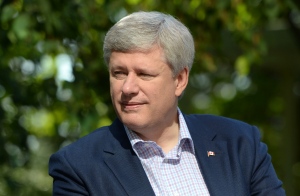Stephen Harper says a Conservative government would raise the amount that first-time homebuyers can draw out of their RRSPs to buy a house — from $25,000 to $35,000 — if elected.
At a campaign stop in Vancouver, Harper said a Conservative government would increase the upper limit of what’s known as the Home Buyer’s Plan. Under current rules, a would-be homebuyer can withdraw up to $25,000 from his or her RRSP without paying a penalty, as long as the money will be used to help pay for a first home.
The homebuyer must also pay back the funds within 15 years, and doesn’t get the benefit of the tax credit while replenishing the money.
Under the new Conservative proposal, that limit would be increased to $35,000.
“For most Canadians, the family home is their biggest asset and their most significant investment in their future financial security. It’s also the centre of their lives,” Harper said.
Since the plan started in 1992, more than 2.8 million Canadians have used the plan to help pay for a first home, the Canadian Real Estate Association, which represents realtors across the country, said in a release following the policy pledge.
The plan would cost the government $30 million a year in lost tax revenue starting in the 2017-18 fiscal year, Harper said.
Foreign buyer scrutiny
Harper also promised to take a closer look at how foreign money may be influencing the housing market in Toronto and Vancouver, two cities that have seen outsized gains in home prices for several years now.
“We need to ensure we have the necessary information to assess the situation and take action,” an announcement on the website for the Conservative Party of Canada said.
“We’re announcing that our government will commit to collecting data on foreign buyer activity in Canada’s housing market. We will take action in co-ordination with provinces, as necessary, to ensure foreign investment in Canada’s housing sector increases the availability and affordability of homes for Canadians.”
Campaign material provided by the Conservatives to The Canadian Press pointed to rules in other countries that force foreign investors to only purchase homes under construction, or to limit home ownership for foreign nationals to just the time that they live in the country.
About 15 per cent of the condos in Vancouver are empty year-round by some estimates, with the owners sitting on the properties hoping to make a profit as the prices of homes rise. Other estimates, including one calculation by the Canada Mortgage and Housing Corporation, puts the number at 2.4 per cent of the condo market.
There is also speculation that investors are driving up the cost of housing in Vancouver, raising concerns of a housing bubble in Canada’s hot housing market.
CBC News




